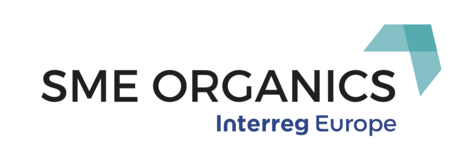

Political and financial support provided through the European Union and national and regional governments’ policies are crucial for creating and further developing a steady market demand, a solid supply base and good operating conditions for stimulating organic food and farming in Europe. These factors have contributed significantly to the growth of the EU organic food market and the expansion of the supply base. In the EU alone, organic farming represented 6.7% of agricultural land in 2016, due to policy support and a strong demand for organic produce amongst EU consumers. Moreover, the EU market doubled in value over the last decade, from €14.5 billion in 2007 to €30.7 billion by 2016.
With current trends indicating that EU demand for organic produce is far outstripping production levels, there are great opportunities to enhance the competitiveness and sustainability of small and medium enterprises (SMEs) in the organic sector as innovative solutions for the whole agri-food sector. Organic action plans can help organic SMEs and the European agri-food sector to develop in a more holistic way. They do this by providing a framework for integrating different policies into a broader policy picture, and setting common objectives, targets and actions that serve the organic sector’s needs and meet public policy goals in a specific country or region.
While in the past organic action plans mainly focused on the supply of organic produce, there is growing interest in developing the whole organic supply chain. Such developments offer attractive prospects for SMEs who wish to make the move to organic, whilst contributing to policy goals for rural employment, economic development, the environment and climate action. This includes the European Development Fund’s (ERDF) Investment for Growth and Jobs goal. The rich experience of organic action plan development, implementation and evaluation in Europe can also help to inform the formulation of future policy objectives, targets and policy instruments at EU, national and regional levels.
The first organic action plans were developed at national level and later at EU level. Now, more and more organic action plans are developed at regional level, tailored and adapted to the needs of local policy makers and stakeholders. This was one of the reasons why the SME Organics project was funded under Interreg Europe financed by the ERDF.
The methodology for developing, implementing and evaluating organic action plans is based on the results of the EU project ORGAP, funded under the sixth EU Framework Research Programme. ORGAP developed a very useful resource manual and toolbox for the development, implementation and evaluation of organic action plans (published by FiBL – Research Institute of Organic Agriculture (Frick, Switzerland) and IFOAM EU (Brussels, Belgium)).
Building on this knowledge the SME Organics project team decided to integrate the experiences in the development of regional organic action plans into an updated version of the manual. In this second edition several sections have been updated and recommendations for policymakers and stakeholders put forward drawing on nearly two decades of research and practice, including the experiences from the first phase of the SME Organics project. We trust that these recommendations can also inform EU Member States’ and regions’ future Research and Innovation Strategies for Smart Specialisation. Furthermore, the text is illustrated with many examples taken from the SME Organics project and further afield.
We wish to thank all the people who have contributed to this manual, in particular the editors of this second edition and the members of the SME Organics project team and other experts for sharing their experiences.
We hope that this manual will help stakeholders from both the organic and non-organic sectors, policy makers and administrators to further develop, implement, and evaluate successfully future organic action plans in order to support sustainable development in Europe for years to come.
Alberto Enrique Martín
SME Organics Project Coordinator,
INTIA, Villava, Navarra, Spain
Otto Schmid
SME Organics project team member and ORGAP Scientific Project Coordinator
FiBL, Frick, Switzerland